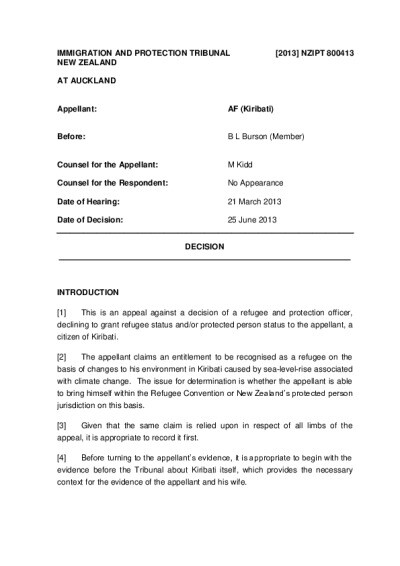
Date
Geographical Area
Pacific
Countries
New Zealand
Keywords
Case Name
AF (Kiribati) v New Zealand Government
Case Reference
[2013] NZIPT 800413
Name of Court
Immigration and Protection Tribunal, New Zealand
Key Facts
Following their application for recognition as a refugee while in New Zealand, a Refugee and Protection Officer refused to grant refugee status and protected person status within New Zealand’s jurisdiction to Mr AF and his wife, who were citizens of Kiribati.
Mr AF appealed against the decision of the Refugee and Protection Officer to the New Zealand Immigration and Protection Tribunal in 2013. During the hearing, he argued that the changes to the environment in Kiribati caused by the rising sea level associated with climate change consequently threatened his human rights and that of his family. Mr AF further contended that such circumstance compelled their migration from Kiribati to New Zealand. He, therefore, claimed that they were entitled to be recognised as refugees or protected persons in New Zealand.
Mr AF appealed against the decision of the Refugee and Protection Officer to the New Zealand Immigration and Protection Tribunal in 2013. During the hearing, he argued that the changes to the environment in Kiribati caused by the rising sea level associated with climate change consequently threatened his human rights and that of his family. Mr AF further contended that such circumstance compelled their migration from Kiribati to New Zealand. He, therefore, claimed that they were entitled to be recognised as refugees or protected persons in New Zealand.
Decision and Reasoning
Mr AF’s appeal required the Tribunal to determine whether he and his family were refugees, as per the 1951 Refugee Convention, as amended by the 1967 Protocol, and so were protected persons under the New Zealand Immigration Act, 2009. The Tribunal held as follows:
Mr AF and his wife failed to establish that they would be persecuted if they returned to Kiribati. Given their circumstances, persecution required the risk of imminent and severe harm and death to them. Moreover, since their alleged fear of being persecuted was not linked to the 1951 Refugee Convention grounds of race, religion, nationality, membership of a particular social group, or political opinion, it was, therefore, ill-founded and could not amount to serious harm. Consequently, this implies that they could not be considered refugees, which is the requirement for protected persons within New Zealand’s jurisdiction.
Additionally, since Mr AF and his family failed to migrate to safer zones in Kiribati, where people maintained a socio-economic existence, their migration to New Zealand was consequently voluntary and not forced upon them by climate change. Mr AF and his family had failed to bring themselves within the 1951 Refugee Convention and New Zealand’s protected person jurisdiction. Therefore, they did not deserve international protection.
Mr AF and his wife failed to establish that they would be persecuted if they returned to Kiribati. Given their circumstances, persecution required the risk of imminent and severe harm and death to them. Moreover, since their alleged fear of being persecuted was not linked to the 1951 Refugee Convention grounds of race, religion, nationality, membership of a particular social group, or political opinion, it was, therefore, ill-founded and could not amount to serious harm. Consequently, this implies that they could not be considered refugees, which is the requirement for protected persons within New Zealand’s jurisdiction.
Additionally, since Mr AF and his family failed to migrate to safer zones in Kiribati, where people maintained a socio-economic existence, their migration to New Zealand was consequently voluntary and not forced upon them by climate change. Mr AF and his family had failed to bring themselves within the 1951 Refugee Convention and New Zealand’s protected person jurisdiction. Therefore, they did not deserve international protection.
Outcome
Mr AF’s appeal was dismissed. Since the Tribunal held that Mr AF and his family were not entitled to be recognised as refugees as per the 1951 UN Refugee Convention and protected persons within New Zealand jurisdiction, they were not entitled to remain in New Zealand, signalling their deportation to Kiribati.
See also: UN Human Rights Committee, Communication No.2728/2016, UN Doc. CCPR/C/127/D/2728/2016 (7 January 2020).
See also: UN Human Rights Committee, Communication No.2728/2016, UN Doc. CCPR/C/127/D/2728/2016 (7 January 2020).
Disclaimer
This case law summary was developed as part of the Disaster Law Database (DISLAW) project, and is not an official record of the case.
Document
Document